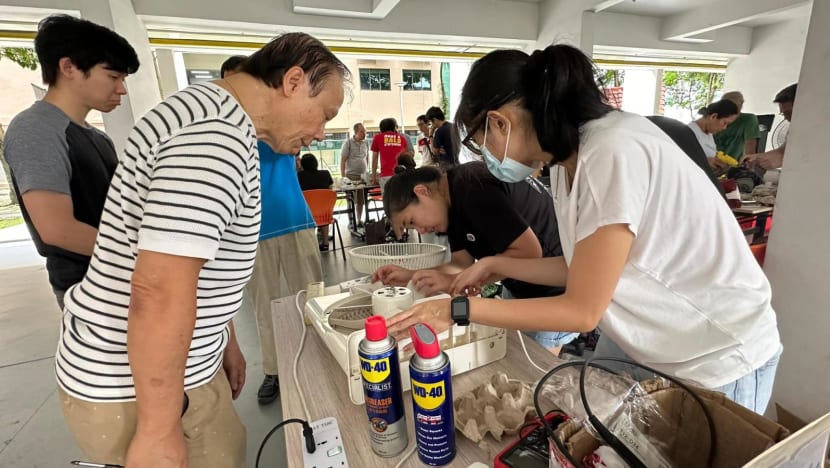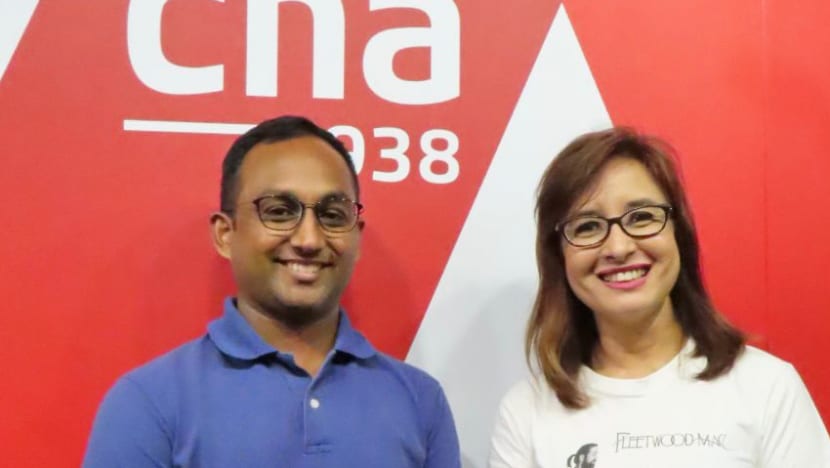Repair Kopitiam: How one Singaporean was inspired by a Dutch concept to fix things here

Repair Kopitiam coaches in action. (Photo: Facebook/Repair Kopitiam)
SINGAPORE: While many may pass by discarded household items like kettles and fans at Housing and Development Board (HDB) void decks without a second glance, some have been inspired by them.
Members of sustainability consultancy Sustainable Living Lab took these items and repaired them with the tools and equipment they had at their makerspace, housed at the National Design Centre.
“Once we discovered that this was happening quite often, we decided to make a programme out of it,” said director and founder of the Lab Veerappan Swaminathan.
This programme, called Repair Kopitiam, was co-founded by Mr Veerappan in 2014.

He and his co-founder Farah Sanwari fashioned it after a Dutch initiative called Repair Cafe, but made some changes as they could not use the exact model in Singapore, he told CNA938’s Melanie Oliveiro on the Made in SG show.
The original concept was based on people already knowing how to repair items. However, in Singapore, such skills were lacking, and they realised they had to improve repairing competency, Mr Veerappan said.
“We started to focus more on developing the pre-training before people start engaging in repair,” he added.
“That's what the current model has evolved to today, which is about 10 weeks of training with a repair coach, then subsequently volunteering your services with the community to help others repair items as well.”
They started with one Repair Kopitiam in Jurong, and have since expanded to nine locations.
These community repair meetups take place on the last Sunday of every month. About 20 to 30 repair coaches are typically on site to provide free-of-charge assistance.
They are equipped with tools to fix a range of items from malfunctioning electronics to torn clothes and damaged furniture.
Recently, Repair Kopitiam was recognised under the Design Singapore Council’s People of Design campaign, which was launched in June to spotlight those making an impact on society using design.
WHAT ARE THE MOST COMMON ITEMS?
The top items brought in for fixing are fans, irons, kettles and rice cookers, said Mr Veerappan.
Repair coaches have also encountered items like vinyl players and air fryers, he added.
However, Repair Kopitiam, which is run by the non-profit arm of Sustainable Living Lab, has a policy of not repairing some items despite having the ability to do so.
These include mobile phones, laptops and bicycles. This is to prevent the initiative from cannibalising local businesses that offer repair services for such items, said Mr Veerappan.
“For the other stuff like household appliances for which such services don't exist, I think we feel a need,” he said.
Items like microwave ovens are also not fixed for safety reasons: If a component is damaged during repairs, it could pose danger to the user when turned on again.
He urged the public to check Repair Kopitiam’s frequently asked questions (FAQ) section on its website or Facebook page to avoid making a wasted trip. There is also an option to book slots.
They may also seek help on the Facebook page, where members give advice on items that can be fixed, said Mr Veerappan.
LEARNING TO FIX ITEMS
Repair Kopitiam has so far trained thousands of volunteers.
The minimum age for those who want to undergo training is 15, and even then, till they are able to sign their own consent forms, they must be accompanied by their parents, said Mr Veerappan.
“It’s both a safety issue as well as fine motor skills (issue), because sometimes you need to apply a bit of strength to open certain things and very directed strength as well,” he said.
“There's also equipment that obviously can hurt you even if you’re careful, and we also need to teach you electrical theory and so on, so if you’re a little bit young, you may not understand,” he added.
Most of the coaches are men above the age of 60, he noted.
The youngest trainee so far, the child of a repair coach, was about just nine years old.
Sometimes, people even learn without attending the training - they mill around at repair stations.
“They're learning by observing how other people do things. And there's a lot of good learning value in that,” said Mr Veerappan.
He added that Repair Kopitiam is looking to expand to 15 locations, and that coaches do not necessarily need to volunteer to make an impact.
“You can also do that simply by spreading the awareness and culture in your workplace or home,” he said.

No comments
Share your thoughts! Tell us your name and class for a gift (: